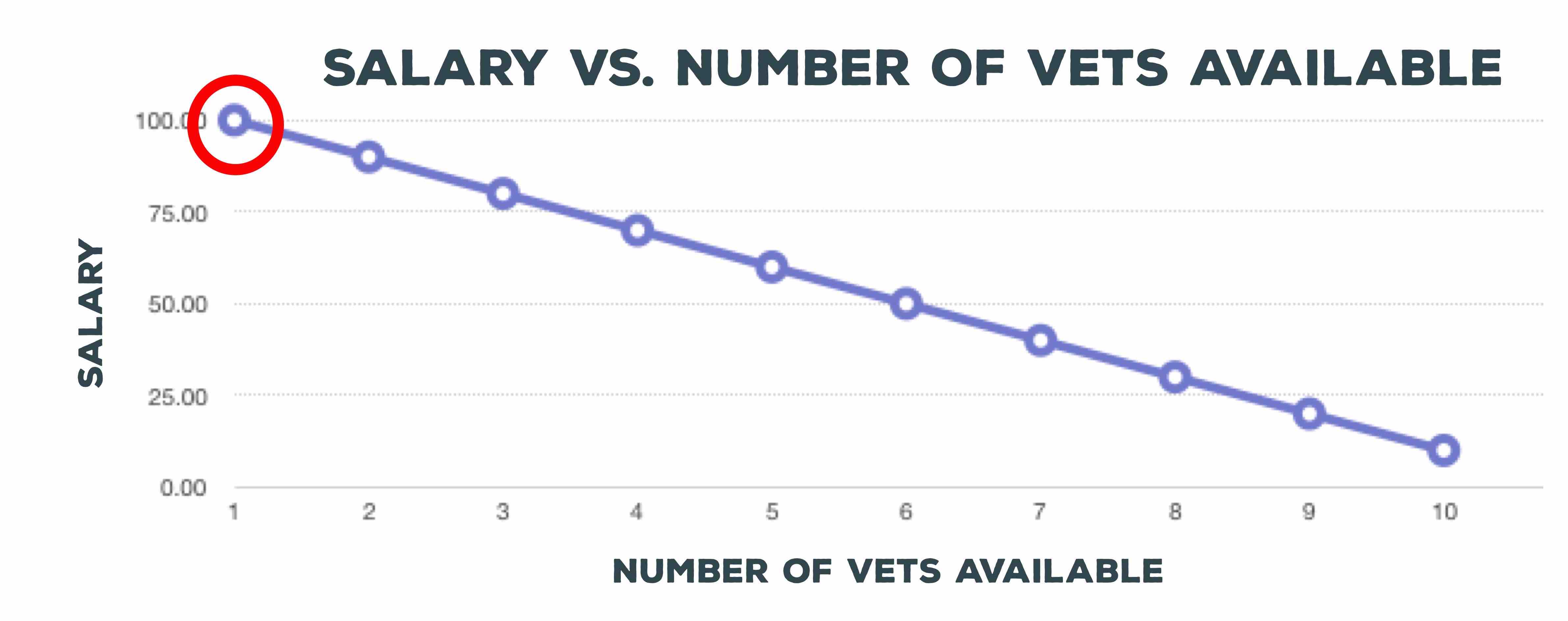Introduction
As a veterinarian that is either new to the profession, or new to an area or country, you are likely unsure what a proper wage should be. You won’t want to be greedy, but you also won’t want to be undervalued.
Your concept of a fair and competitive wage will come from online forums/groups, staffing agencies, industry standards gathered from websites such as PayScale or Indeed, or nationally mandated minimums. Otherwise you might just wait to see what you are offered and hope for the best. Usually there will be a giant range in these numbers, which is unhelpful.
Figure: Chasing the elusive appropriate wage
KICK ASS VETS is going to look at how to mathematically approximate what a full-time, experienced veterinarian salary should be. This will take into account both what you are worth to the clinic and also what you are worth in relation to the market.
IMPORTANT NOTE:
KICK ASS VETS is will be talking about what you SHOULD be paid, because until we start talking about appropriate compensation, and ADVOCATING FOR OURSELVES from the ‘ground up’, the industry will not change!
Percentage of Gross Production
Country to country, region to region, veterinarians will be paid differing amounts based on what veterinary medicine is worth in that country, how Veterinarians are valued, and cost of living in that city or place. So, how do you know what this value is when you are new to the field, either as a new graduate or new to a country or region?
Businesses, across industries, typically use your expected 20% comission rate as an acceptable salary. This means you should be paid 20% of the gross income you bring into the business. Anything that you ‘sell’ (consult fees, prescriptions, surgeries, lab work, imaging, etc) is considered 'gross income'. Your salary should be approximately 20% (one fifth) of this. In Australia, factoring Super, Vacation Pay and Sick Leave, your salary should be approximately 16.6% (one sixth) of your gross income.
Example:
IF: Consult Fee= 85$, 4 consults/hour, work 7.5hr/day.
Gross Production= 7.5 * 4 * 85$ * 5days/week = $12,750/week
IF 2 weeks Vacation:(standard for North America):
$12,750/week * 50 working weeks = $637,500
Now take 20% of this as your income: $127,500.
NOTE ON AUSTRALIA:
Since Australian government requires employers to pay Super , 4 weeks vacation + 2 weeks sick leave, we need to factor these into our equation:
$12,750/week * 46 working weeks = $586,500
$586,500*20% = $117,300 / 1.095 (super contribution) = $107,123
= salary of $107,123 + Super + 4 weeks vacation + 2 weeks sick leave, for a full time, experienced veterinarian.
NOTE: In Australia, due to Super Pay, Generous Vacation and Sick Pay, another way to get an EASY approximation is to do 1/6 (16.7%) of Gross Production based off of 52 weeks work:
$12,750/week * 52/weeks = $663,000/6 = $110,500.
This is a MINIMUM of what you should be bringing into a clinic, as with diagnostics, prescriptions, etc, you should be 'selling' more than just a consult each time-slot
SUMMARY: So, using the above calculations, you can approximate what a full time vet in your area SHOULD be making, based off the consult fee. This is a rough estimate, however it is a good starting place. Once you start working you can see how many consults you are doing each hour, and how much more you are ‘selling’ based on surgeries, prescriptions, etc. Using the base consult fee is usually a MINIMUM of what you will bring into a busy, functional clinic.
IMPORTANT NOTE:
What you SHOULD be making doesn’t always correspond to what you WILL be making. MARKET FACTORS need to be taken into account as they will affect your salary.
Market Factors
Once you have the above evaluation, and you have an approximation as to what your ‘full time wage’ SHOULD be according to production, you need to take “Market Factors” into consideration.
There are two main Market Factors:
INDUSTRY STANDARDS: Countries/Areas will a have pre-set amount that they feel veterinarians are worth. This is sometimes determined by true financial value to clinics, and will be close to the production calculation above, but other times it will be determined by ‘tradition’ or ‘custom’, which can be arbitrary or grossly outdated. This ‘Industry Standard’ can be very hard to combat, and change requires a joint effort of associates advocating for themselves and refusing to accept offers that are too low.
NOTE: In Australia 'Modern Award' is a government mandated minimum that Veterinarians are required to be paid by law. However, this 'Modern Award' value is unacceptably low, and unfortunately is being used as justification of 'Industry Standard'.
IMPORTANT NOTE:
The average number of years a vet stays in clinical practice is 5 years, this means the ‘average’ income often used as industry standard for full income, is skewed as 20% of that ‘average’ is a much lower ‘new grad wage’. Therefore, it is important to advocate for an appropriate full time, experienced salary, and not allow clinics to use ‘average salary’ across the country as an excuse.
CURRENT MARKET: In every job, industry, or economic system, there is a ‘Supply’ and a ‘Demand’. The lower the Supply, the higher the Demand, and vice versa. As the Demand increases costs of products, or in this case salaries, increase. This means, that if there are a high number of jobs that need to be filled, and few vets to fill them, a higher salary can be justified. This is the current market, especially in Australia. The market is in your favour!
Supply vs. Demand Curve: The less veterinarians available to fill a job, the higher the salary due to demand to fill that job. Current market is a LOW SUPPLY, and therefore a HIGH DEMAND. The red circle indicates the current market in Australia, as well as in emergency medicine across North America.
SUMMARY: Let’s say a full-time working vet in Urban Australia SHOULD be making about $120,000. Due to Industry Standard being about $85000 (significantly undervalued in KICK ASS VETS' opinion), and due to Market Demand /Supply being in your favour, land on $100,000-$110,000 being a very achievable full time, experienced vet salary if you negotiate well and find a good clinic.
IMPORTANT NOTE:
Industry Standard is a very hard factor to move, and in order to change this Industry Standard we need to all work together and start advocating for better wages! Very few clinic owners, and almost no large companies, will raise salaries out of ‘good will’. The current trend is moving towards the 'disposable' vet with companies letting good vets quit and hiring the ‘cheaper’ alternative. We need a collective stance to improve the field for ourselves, and for the future!
Salary Negotiation Factors
The veterinary profession is so diverse, and so complicated, that you can essentially have any type of job, hours, or responsibilities you can dream of. It is one of the amazing aspects of the veterinary field. However, some of these factors will either increase, or decrease your salary. Here we will provide a brief list of factors, however see ‘Negotiation Tactics’ Blog for more details.
IMPORTANT NOTE:
DECREASED SALARY FACTORS: Your salary could be lower if your job abilities are limited and you cannot perform certain tasks (ex. you don't do surgeries), if you are inefficient, if your production or income to a clinic is lower because you choose to see less consults/hr, or if you choose to work in a very quiet clinic because you want to have an easy day. At KICK ASS VETS, we are huge advocates for appropriate wages, but we are also advocates for working hard at your job. If you choose to work slowly, or if you have a life situation (sometimes out of your control) that is constantly pulling you away from work or slowing you down, your salary will reflect this.
IMPORTANT NOTE:
INCREASED SALARY FACTORS: Factors that you might perform that constitute a higher salary include: working 'non-normal' hours, teaching/mentoring/training any other staff, making rosters/schedules, handling complaints, making policies/procedures, working in remote or undesirable locations, etc. If your job description changes to include these factors, negotiate a pay rise!
Let's Get Personal
When I first moved to Australia I trusted in an agency to be honest with me about what salary was appropriate. I knew what I was used to in Canada, however I had no idea what the Industry Standard was for Australia. I trusted this agency to give me accurate information, and to expose me to the type of clinics in which I was interested.
This agency 'linked' me up with some clinics, and told me what salary I could expect as a best case scenerio. I took the job at the 'top' rate the agency recommended.
After 6 months I switched jobs and negotiated a starting salary of $10 000 higher than my initial salary, still believing in the Industry Standard told to me by the agency, and thought I was doing well for myself. I then realized that locums were working easier shifts and being paid DOUBLE per hour what I was making. I negotiated a pay raise with my manager, and my wage increased another $8000. Our senior vet then left leaving me in a teaching role, and my salary went up a further $7000.
After starting Vet Locum List and speaking with various veterinarians, clinics and managers, I realized that vets with my level of experience and for the work I was doing, should have a wage another $15 000- $25 000 higher than this.
I realized through this experience that you can't trust agencies to be in your best interest because they are working for the companies they represent. Agencies will try to 'fill the job' however they can for their companies to get the commission, as well as only expose you to clinics that are registered with their agency. Although this is obvious when you sit down and think about it, the motives are NOT in the best interest of the vet, despite their claims. (This was the starting point for creating Vet Locum List, a website service with complete transperancy, NOT an agency!)
I also realized that clinics will not pay you appropriately out of the goodness of their hearts, and will use any excuse to pay you below your value. I also learned that you can negotiate up, at any time, even if you start off way too low, or are 'mid-contract'! In 1.5yr I increased my salary by $25,000!
In hindsight, I STILL hadn't pushed hard enough, and this was due to truly not knowing what was appropriate or acceptable. I trusted others instead of doing my own research. This was when I started focusing on how associate vets are treated and valued. It was at this time when I really started chatting with students and new grads, and my passion behind KICK ASS VETS was born.
SUMMARY: You can easily get a base starting 'anchor' for your negotiations from the consult fee of your potential clinic. This consult fee will help by being an indicator of cost of living and therefore will help diminish the ‘average salary for the country’ affect or argument. It will also give an approximate gauge of what your gross production should be. One you get this rate, you can assess the market factors, and come up with a reasonable starting point for your negotiations for a fair salary. You can then take other factors into account that will increase your wage, and either offer to perform these duties for a higher salary, or use them as justification for a higher wage.
Written by Dr. Ann Herbst BSc, DVM
Published July 20th, 2019
Advocate for yourself, you are the only one that will!
Most Recent Blogs
KICK ASS Boundaries for Locums
Locuming can leave you just as stressed and exhausted as full-time work, if you don't set the right boundaries!
Imposter Syndrome
Chances are you will experience Imposter Syndrome in your career, so tackle it head on!
KICK ASS Confidence
Confidence is knowing that you cannot know everything, and new/recent graduates need to know this!





